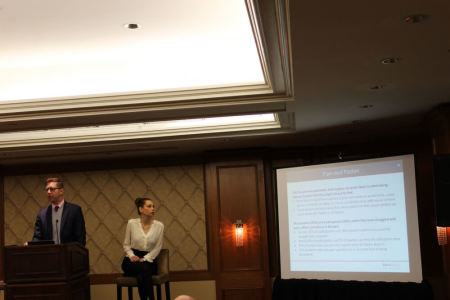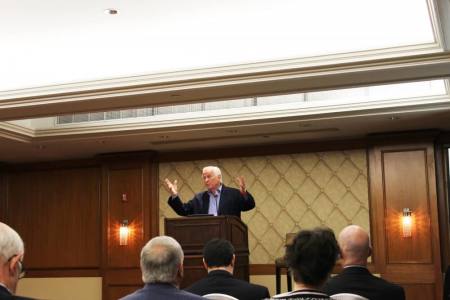Many Adult Christians Think Pastors Who View Porn Should Resign or Be Fired

NEW YORK — Forty-one percent of adult Christians believe pastors who view porn should be fired or asked to resign even though most believe it's a prevalent problem among leaders and laity in the church, according to a new Barna study.
Titled "The Porn Phenomenon," the study commissioned by Josh McDowell Ministries in Plano, Texas, and Covenant Eyes has been hailed as the most comprehensive one to date on porn, the American population and the Church.
The tough verdict on pastors and porn use from adult Christians was among the many findings of the study that were presented at the Omni Berkshire Hotel in New York City on Tuesday.
Faith leaders in the study readily admitted to being exposed to porn by accident like much of the general population online through pop-ups or unsolicited email. Youth pastors were also more likely to find sexual content via social media like Twitter or Instagram.
More than half the cohort of both pastors and youth pastors in the study said they had either struggled with porn in the past or were currently struggling with it. More than half of them also admitted to living in constant fear of being discovered.
Some 29 percent of adult Christians surveyed said pastors using porn should be asked to take a leave of absence until they dealt with the problem, while some 16 percent said pastors struggling with a porn habit should be allowed to teach while getting help.
Only 5 percent of adult Christian respondents felt pastors who view porn should face no action.
"I'll tell you right now, there is not one church, one Christian leader, one pastor, including myself, that has an answer for it," said Josh McDowell, founder of Josh McDowell Ministries, after the findings from the study were presented. "No traditional message of solution will work."

For "The Porn Phenomenon" report, Barna conducted five online surveys in July and August 2015, fielding 3,109 participants who were allowed to provide answers anonymously.
McDowell said solutions to the porn phenomenon must reflect an understanding of spiritual, scientific, social and cultural factors.
Indeed, the findings from the study note that there is also no real consensus on the definition on porn in the American context.
"For Americans, it's more a question of function than form," noted the researchers. Something functions as porn when it is used for the purpose of arousal or masturbation. Images that depict sex, sexual scenarios, or nudity that is sexually arousing also count as porn.
Most people do not believe full nudity or especially partial nudity qualify as porn. There is also a wide range of definitions across various segments of society, according to the study.
It notes that while people use porn mainly for arousal, some also use it out of boredom, curiosity and for fun as well as finding sex tips.
McDowell, along with Covenant Eyes, will host the Set Free Global Summit in Greensboro, North Carolina, from April 4-7. The trouble is, he says, not many pastors seem willing to participate.
Of the 70,000 pastors who have been invited, just seven have signed up to attend so far, says McDowell.
Overall, according to the study, 21 percent of youth pastors and 14 percent of pastors admit they currently struggle with using porn. About 12 percent of youth pastors and 5 percent of pastors say they are addicted to porn.
Some 87 percent of pastors who say they use porn say they also experience a great sense of shame about it and 55 percent live in constant fear of being discovered.
David Kinnaman, president of the Barna Group and Roxanne Stone, editor-in-chief of Barna Group who presented the findings of the study, noted that porn is now a much more readily "researchable" topic than it was two decades ago because it no longer has the same social taboo. And this was reflected in the generational divide in reactions to the topic in their study.
In responding to the question on whether porn is good or bad for society, adults over 50 believe it's bad. Adults 31-49 and teens were split between porn being bad or neutral, while young adults were most likely to believe that porn is good for society.
The study reports that only a small minority of both adults and teenagers experience any feelings of "guilt" about porn.
Teens and young adults have "encouraging" or "accepting" conversations toward porn. When they talk about porn with friends, 89 percent of teens, and 95 percent of young adults say they do so in an either neutral, accepting, or encouraging way.
According to the study only one in 20 young adults and one in 10 teens say their friends think viewing pornography is a bad thing. Only child porn and non-consensual sex are considered "always wrong" by a large majority of Americans.
"Right now the Church, to its disgrace, is trying to fix broken men and we are not raising healthy children. Everybody says when it comes to children, parents are on the frontline. I say no, the pastor is on the frontline. Because if the pastor, the church does not take its responsibility and work with parents, train parents, educate parents, and I don't just mean biblically — scientifically, medically culturally," said McDowell.
"You cannot understand pornography if you don't understand neurology. And 95 percent of pastors don't understand neurology. You've got to understand the brain, I don't care who you are, and — the greatest pastor in America — you cannot come up with an answer to pornography if you do not understand the brain. It is a different animal than the Church has ever tried to fix," he added.





















